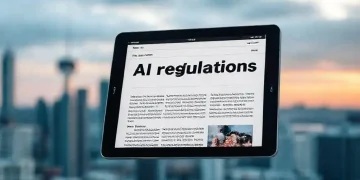Improve ai regulation news for better future

Improving AI regulation is crucial for ensuring safety, promoting ethical practices, and fostering innovation while addressing risks posed by complex AI systems and rapidly advancing technology.
Improve ai regulation news is a topic gaining traction as societies grapple with the rapid advancement of technology. But what does this mean for our daily lives? Let’s dive into the details.
The need for enhanced AI regulations
The need for enhanced AI regulations is becoming increasingly clear as artificial intelligence technology evolves. As AI capabilities expand, so do the potential risks and ethical dilemmas that come with it. Understanding these risks is essential in guiding the future of AI development.
Understanding the Risks of AI
AI systems can make decisions that significantly impact society. Hence, it’s vital to ensure they operate within safe and ethical boundaries. Unregulated AI may lead to instances of bias, privacy breaches, and even unintended harm. Such challenges underline the necessity for better regulations.
Key Reasons for Enhanced AI Regulations
- **Preventing Bias**: AI systems trained on flawed data can perpetuate biases that affect marginalized groups unfairly.
- **Protecting Privacy**: Regulations help ensure that personal data is handled responsibly, maintaining users’ trust.
- **Promoting Transparency**: Clear regulations can make AI processes more understandable for users, allowing them to know how decisions are made.
- **Encouraging Innovation**: With clear guidelines, companies can innovate confidently, knowing they are in line with best practices.
Establishing robust regulations may also help to mitigate fears around job displacement caused by AI. For instance, a well-regulated AI landscape can encourage the integration of AI as a tool that assists rather than replaces human workers. This aspect is crucial in ensuring that the workforce can adapt and thrive alongside advancing technology.
Furthermore, enhanced AI regulations can foster collaboration among different sectors. Government bodies, tech companies, and research institutions can work together to create standards that ensure safety and ethical use of AI technology. This cooperative effort is fundamental for establishing a balanced approach to AI governance.
In summary, enhancing regulations around AI is not just a technical necessity but a holistic approach to safeguard users and society at large. These regulations will shape the AI landscape, fostering innovation while ensuring ethical standards are upheld.
Recent developments in AI regulation news
Recent developments in AI regulation news highlight the rapid evolution of policies aimed at managing artificial intelligence. Countries are beginning to recognize that as AI technology grows, so does the need for comprehensive guidelines.
New Legislative Initiatives
Many governments are introducing legislation that directly addresses AI issues. For example, the European Union has proposed new rules designed to ensure that AI applications are safe and respect fundamental rights. This initiative is in response to the increasing concerns over privacy and ethical use of AI.
Notable Regulatory Frameworks
- **The EU AI Act**: This act categorizes AI systems based on risk levels, defining strict requirements for high-risk applications.
- **United States Initiatives**: Various states are formulating their own AI regulations, focusing on transparency and accountability.
- **Global Standards**: Organizations like ISO are working to develop international standards that guide ethical AI development.
- **Public Consultation**: Many regulatory bodies are seeking input from the public and industry stakeholders to shape practical guidelines.
As these regulations emerge, they pose significant implications for companies. Businesses need to navigate these changes to ensure compliance while fostering innovation. The ongoing dialogue between regulators and tech companies is critical in crafting a balanced approach.
Furthermore, many tech giants are proactively establishing internal policies that align with upcoming regulations. This proactive stance not only helps them meet compliance needs but also builds public trust. For instance, some companies are developing AI ethics committees to oversee their projects.
In addition to legislation, there are significant discussions around the ethical implications of AI. Various stakeholders, including ethicists and technologists, are advocating for the development of guidelines that prioritize user safety and transparency. These conversations are pivotal in shaping the future landscape of AI governance.
Key challenges in regulating AI technology

Key challenges in regulating AI technology are becoming more apparent as the field rapidly advances. As governments and organizations try to keep up, understanding these challenges is essential for effective governance.
Complexity of AI Systems
One major hurdle in regulation comes from the complexity of AI systems. Many AI models operate as black boxes, making it difficult to understand how they arrive at certain decisions. This lack of transparency poses risks, especially when AI systems affect people’s lives.
Rapid Technological Advancements
- **Innovation vs. Regulation**: Striking a balance between fostering innovation and implementing regulations is challenging. Too many restrictions can stifle creativity, while too few can lead to misuse.
- **Keeping Up with Change**: AI technology evolves quickly, making it hard for lawmakers to catch up and create relevant regulations.
- **Global Disparities**: Different countries have varying approaches to regulating AI, creating inconsistencies and regulatory gaps.
- **Public Perception**: Misinformation about AI can lead to public fear and resistance against regulations that seem intrusive or unnecessary.
Another challenge lies in establishing standards that apply to diverse AI applications. From autonomous vehicles to facial recognition technology, each use case may require tailored guidelines. This customization complicates the regulatory landscape further.
Additionally, ensuring ethical use of AI poses another significant challenge. Stakeholders must agree on what constitutes ethical AI use. This task is not easy, as the definition of ethical behavior may vary between cultures and industries. Therefore, global collaboration is needed to set universal ethical standards.
Lastly, the issue of accountability raises questions about who should be responsible when AI systems make mistakes. Determining liability in cases of AI errors can be a complex legal matter involving developers, users, and companies. Until clear accountability frameworks are established, these questions will persist in the dialogue surrounding AI regulation.
Impacts of AI regulations on businesses
The impacts of AI regulations on businesses are significant and multifaceted. As governments implement new rules, companies must adapt to remain compliant while also leveraging AI technology effectively.
Compliance Costs
One of the immediate effects of AI regulations is the rise in compliance costs. Businesses need to invest in systems, training, and legal advice to ensure they meet regulatory requirements. This can be especially challenging for small and medium-sized enterprises.
Innovation and Development
- **Encouraged Innovation**: Regulations can drive innovation by setting clear guidelines that encourage companies to develop compliant and ethical AI solutions.
- **Risk Mitigation**: By following regulations, businesses can reduce risks associated with potential misuse of AI technologies that could lead to legal issues or reputational damage.
- **Market Creation**: Stricter regulations may also create new markets for compliance solutions, opening doors for startups that specialize in helping companies adhere to AI laws.
- **Investment in Ethics**: Companies may also begin to invest more in ethical AI practices, improving their sustainability and public image.
Moreover, regulations can level the playing field. When all businesses adhere to the same guidelines, it prevents larger companies from exploiting loopholes that smaller firms cannot navigate. This dynamic is crucial for fostering a fair competitive environment.
However, there are challenges. Some businesses may feel that regulations stifle creativity and speed of development. This may lead to slower rollouts of new features or products related to AI. Companies often need to balance their innovation goals with compliance timelines.
In addition, businesses may need to reassess their AI strategies. Regulations may limit certain applications of AI, prompting companies to rethink how they use technology while still serving their customers effectively. Adapting to these changes involves continuous monitoring of the regulatory landscape.
The future outlook for AI regulation
The future outlook for AI regulation is increasingly critical as technology continues to advance rapidly. Regulatory bodies around the world are recognizing the need for frameworks that promote innovation while ensuring safety and ethical standards.
Anticipated Developments
In the coming years, we can expect more comprehensive and harmonized regulations globally. Different countries may collaborate to establish international standards that govern AI technologies. This global approach aims to mitigate risks associated with AI while fostering a fair competitive landscape.
Involvement of Stakeholders
- **Public Engagement**: Regulators will likely engage with the public and various stakeholders more actively. This feedback will play a crucial role in shaping effective regulations.
- **Industry Participation**: Tech companies will probably take part in discussions, providing insights on practical challenges they face while complying with regulations.
- **Academic Contributions**: Researchers and ethicists may become increasingly involved, helping devise guidelines that prioritize ethical considerations in AI development.
- **Global Partnerships**: International collaborations may help in sharing best practices and technologies to facilitate responsible AI deployment.
As regulations evolve, the emphasis will likely shift toward flexible frameworks that can adapt to new technologies. By incorporating adaptive regulations, businesses can innovate without being stifled by overly restrictive rules. This flexibility will foster an environment for ongoing innovation while ensuring accountability.
Furthermore, education and awareness around AI ethics will likely become a priority. As societies grow more reliant on AI technologies, promoting understanding of responsible AI use will help manage public concerns and build trust.
Finally, we may witness the emergence of specialized regulatory bodies focused solely on AI. These organizations could monitor compliance, provide guidance, and ensure that AI systems are designed with safety and ethics in mind. Such bodies could be vital in navigating the complexities of AI technologies.
FAQ – Frequently Asked Questions about AI Regulations
Why is AI regulation important?
AI regulation is crucial to ensure safety, promote ethical use of technology, and foster innovation while mitigating risks associated with AI.
How do regulations affect businesses using AI?
Regulations can increase compliance costs for businesses but also encourage innovation and create new market opportunities for compliant solutions.
What are the key challenges in regulating AI?
Challenges include the complexity of AI systems, rapid technological advancements, and ensuring ethical use while establishing accountability.
What does the future hold for AI regulation?
The future likely involves more global collaboration, flexible frameworks, and increased involvement from stakeholders to build trust and ensure effective governance.





